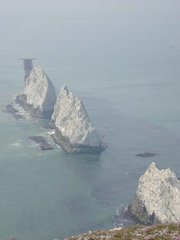Chalk
|
|
- For other uses, see Chalk (disambiguation).
Chalk is a soft, white, porous form of limestone composed of the mineral calcium carbonate. It is relatively resistant to erosion and slumping compared to the clays that it is usually associated with, and so forms tall steep cliffs where chalk ridges meet the sea. Chalk hills, known as chalk downland, usually form where bands of chalk reach the surface at an angle.
Because chalk is porous, chalk downland usually holds a large water table, providing a natural reservoir that releases water slowly through dry seasons.
Chalk has been quarried from prehistory, providing building material and marl for fields. In southeast England, deneholes are a notable example of ancient chalk pits.
The Chalk Formation is a European stratigraphic unit in the upper Cretaceous period. This includes the famous White cliffs of Dover of Kent in England, which formed entirely of chalk deposits.
Blackboard chalk is a substance used for drawing on rough surfaces, as it readily crumbles leaving particles that stick loosely to these surfaces. Blackboard chalk, often supplied in sticks about 5 cm long, is not actually made from the mineral chalk but from gypsum (calcium sulfate). Similarly, the "chalk" used by tailors is usually made from talc (magnesium silicate).
In military terminology, a chalk is a specific aircraft load, especially a group of airborne soldiers which deploy from a single aircraft. U.S. Army Ranger Chalk Four was the group which took the initial casualties in the Battle of Mogadishu in Somalia.
See also
- Chalk Formation
- Southern England Chalk Formation
- List of minerals
- Mohs scale of mineral hardness
- Limestone
- Sidewalk chalk
- Agricultural limede:Kreide
fr:craie he:קירטון nl:Krijt (grafisch materiaal) pl:Kreda (skała) simple:chalk sv:Kalk zh:白垩

